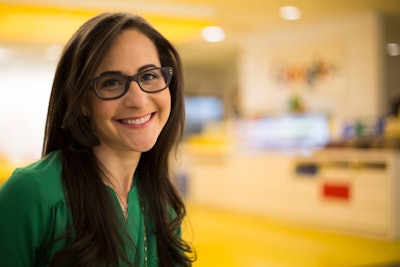
Michelle Rosen Sapir, 33, got her start in nonprofit events, and she credits those early experiences with helping her create meaningful experiential programs that resonate. Now that she leads a team responsible for Google’s United States experiential marketing within the community, policy, and educational fields, she’s putting those skills to work, creating events that allow guests to really connect with the brand. Sapir started as the fifth person on Google’s marketing events team seven years ago; today, there are 20 team members on both coasts led by director Lorin Platto.
“Each time a user interacts with our brand online or offline, we want it to be magical, as well as meaningful and useful,” Sapir says. “[Google puts] a premium on each interaction, whether it’s an [error message] or a live experience.”
Perhaps her team’s most groundbreaking recent project was a partnership with Google Ideas on its October summit in New York.
The summit explored heady issues like cyber warfare, free expression, and big-data analytics. “We wanted to immerse attendees in the experience of using the Internet in a repressive society,” she says, “but we also wanted to make the event fun and Google-y, as we say—not the easiest balance to strike.”
To enliven product debuts, the team created a multiplatform stage with a choreographed light installation around the room “that put the audience right in the middle of the action,” she says.
A so-called “sandbox” was a place where people could use the new products to help illuminate discussion topics. Elsewhere, a digital health clinic that looked like a doctor’s office offered attendees the chance to have their digital security professionally evaluated, complete with prescriptions for how to use the Web more securely.
“Google Ideas summits aren’t spectator events,” Sapir says. “We expected attendees to roll up their sleeves and focus on solutions to problems. We capitalized on that energy through interactive breakout sessions where attendees split up according to expertise and brainstormed specific ways to address technical and geopolitical issues. By the end, attendees were exhausted and inspired—the best combination.”
In the event world beyond Google’s programs, Sapir says she expects experiential marketing to soar. “Experiences are investments,” she says. “The wonder of our world is our ability to be connected with so many things and people at once. Live experiences offer a unique moment in time that allows people to connect.”



















